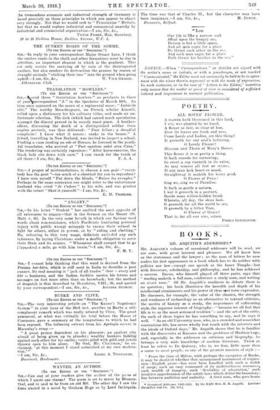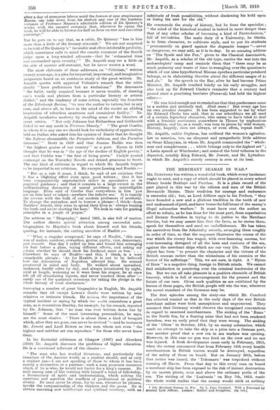BOOKS.
MR. ASQUITH'S ADDRESSES.* Mn. Asnurrn's volume of occasional addresses will be read, we are sure, with great interest and pleasure. We all know him as the statesman and the lawyer ; as the man of letters he now makes his first appearance in a book which has to do neither with politics nor law—except one speech at the Inner Temple—but with literature, scholarship, and philosophy, and he has achieved a success. Bacon, who himself played all three parts, says that " reading maketh a full man, conference a ready man, and writing an exact man." Of Mr. Asquith's readiness in debate there is no question; his book illustrates the breadth and depth of his intellectual attainments and his power of clear and terse expression. He discusses, for example, the value of the classics, the strength and weakness of archaeology as an alternative to textual criticism, the merits of history as a study, the importance of cultivating style, the supreme interest of biography—" because we all feel that life is to us the most serious of realities "—and the art of the critic. On each of these topics he has something to say, and he says it well. " As an old University man, who, in a crowded and somewhat contentious life, has never wholly lost touch with the interests and the ideals of Oxford days," Mr. Asquith shows that he is familiar with the discoveries at Knossos and the problems of Hadrian's ago, and, especially in the addresses on criticism and biography, he betrays a very wide knowledge of modern literature. Twice at least he refers to De Quincey, who is, we fear, little more than a name to most people, as one of the greatest masters of style :— " From the time of Milton, with perhaps the exception of Burke, it may be doubted whether that unsurpassed instrument of expres- sion—English prose—has ever been handled with such a width of range, such an easy command of its multitudinous resources, such wealth of imagery, such flexibility of adaptation,' such intuitive apprehension of the subtle lawn which-define the boundary. line between ambition and audacity. A tired man, who goes home
• Occasional Addresses, 1893-1916. By the Bight Hon. H. H. Asquith. London I Macmillan and Co. 16s. nct.1
after a day of strenuous labour amid the fumum et open strepitumque Ronne, can take down from his shelves any one of the fourteen volumes of Professor Masson's admirable edition of De Quincey's works, with the assured certainty that, wherever he opens the hook, he will be able to browse for half an hour on rare and succulent pasturage."
But he goes on to say that, as a critic, De Quincey " has in him more than a little of the literary coxcomb." We are not surprised to be told of De Quincey's " incurable and often intolerable prolixity, which sometimes calls to mind the caustic comment of the Scotch judge upon a long-winded advocate—that he ' exhausted time and encroached upon eternity.' " Mr. Asquith may err a little on the side of austere self-restraint, but he never wastes a word. The most elaborate of these addresses, on " Criticism," written twenty years ago, is a plea for impartial, impersonal, and imaginative judgments based on an assiduous study of the great writers. Mr. Asquith quotes with approval Voltaire's remark that the critic should " have preferences but no exclusions." He denounces " the habit, easily acquired because it saves trouble, of drawing one's words and phrases from a particular literary or artistic dialect," and the tendency of some critics, especially the founders of the Edinburgh Review, "to tear the author to tatters, but in any case, and above all, to leave in the mind of the reader an abiding impression of relentless smartness and omniscient facility." Mr. Asquith inculcates modesty by recalling some of the blunders of great critics. " Not only Johnson but Richardson and Goldsmith failed to see any merit in Tristram Shandy." " The great Goethe, to whom if to any one we should look for catholicity of appreciation, told an Italian who asked him his opinion of Dante that he thought the Inferno abominable, the Purgatorio dubious, and the Paradiso tiresome.' " Scott in 1810 said that Joanna Baillie was then " the highest genius of our country " as a poet. Byron in 1820 thought that'he was in " the age of the decline of English poetry," and that Crabbe was " the first of living poets." Carlyle poured contempt on the Waverley Novels and denied greatness to Scott. The one kind of criticism in regard to which Mr. Asquith forgets to be impartial is art criticism. He excepts Lessing and Ruskin :- " But as a rule it must, I think, be said of art criticism that it has a blighting effect even upon good writers ; that it has been comparatively unproductive either in speculative or in practical guidance ; and that it consists to a large extent in the unilluminating discussion of unreal problems in unintelligible language. Horn said of Goethe that everywhere in him you are on firm land or island—nowhere the infinite sea.' It is exactly the reverse with the bulk of our modern professors of aesthetic. To change the metaphor, and to borrow a phrase—I think—from Matthew Arnold, they seem to spend their lives in ' always beating the bush and never starting the hare.' We look in vain for guiding principles in a jungle of jargon."
The address on " Biography," dated 1901, is also full of matter. The author directs special attention among successful auto- biographies to Haydon's book about himself and his friends, quoting, for instance, the cutting anecdote of Hazlitt --
" ' What a singular compound,' he says of Hazlitt, ' this man was of malice, candour, cowardice, genius, purity, vice, democracy, and conceit. One day I called on him and found him arranging his hair before a glass, trying different effects, and asking my advice whether he should show his forehead more or less.' . . . Elsewhere he says of Hazlitt--and this, I think, is a very remarkable picture : As for Hazlitt, it is not to be believed how the destruction of Napoleon affected him. He seemed prostrated in mind and body. He walked about unwashed, unshaved, hardly sober by day, and always intoxicated by night, until at length, wakening as it were from his stupor, he at once left off all stimulating liquors, and never touched them after '- surely one of the quaintest occasions for taking the pledge in the whole history of total abstinence."
Surveying a number of great biographies in English, Mr. Asquith remarks that all except Lewes's Goethe were written by near relatives or intimate friends. He notices the importance of the typical incident or saying by which the a mid remembers a great man, as it remembers Bentley, for example, by his remark, reported by Dr. Johnson, that " no man was ever written down but by himself." Some of the most interesting personalities, he says, are the most elusive. " There is about them a kind of bouquet which, after they are gone, can never be revived "—and he instances Mr. Jowett and Lord Bowen as two men whom not even " the highest and subtlest art. can reproduce " for those who never knew them.
In his Rectorial addresses at Glasgow (1907) and Aberdeen (1910) Mr. Asquith discusses the problems of higher education. He is a convinced adherent of the classics :- " The man who has studied literature, and particularly the literature of the Ancient world, as a student should, and as only a student can—I am not speaking of those to whom it has been merely a distraction or a pastime— such a man possesses resources which, if he is wise, he would not barter for a king's ransom. He finds among men of like training with himself a bond of fellowship, a freemasonry of spirit and understanding, which softens the asperities and survives the conflicts of professional or political rivalry. Ho need never be alone, for he can, whenever he pleases, invoke the companionship of the thinkers and the poets. He is always annexing now intellectual and spiritual territory, with an infinitude of fresh possibilities, without slackening his hold upon or losing his zest for the old."
He commends the study of history, but he fears the specialist ; " the mind of the historical student is indeed in more danger than that of any other scholar of becoming a kind of Pantechnicon," hill of trivialities. The main duty of a University, he thinks, is to form character, to cultivate style, and to put its students " permanently on guard against the dogmatic temper "—never so dangerous, we may add, as it is to-day. In an amusing address on " The Spade and the Pen," given to the Classical Association, Mr. Asquith, as a scholar of the old type, carries the war into the archaeologists' camp and reminds them that " there may be as much pedantry and waste of time in wrangling over the question to which of our nine hypothetical Minoan epochs &particular potsherd belongs, as in elaborating theories about the different usages of dv and ay." In the speech to the Bar, after he had become Prime Minister, Mr. Asquith touched briefly on his early struggles, and also took up Sir Edward Clarke's reminder that a century had passed since a practising barrister (Perceval) had held the highest office :-
" He was kind enough not to remind me that that predecessor came to a sudden and untimely end. Absit omen 1 But every age has its own peculiar dangers. It has been suggested to me by what Sir Edward Clarke has said, that in our schooldays we all read of a certain legendary character, who seems to have tried to deal with a feminist movement somewhere in Thrace by euphonious generalities, and he, as a result, was torn to pieces by wild women. History, happily, does not always, or even often, repeat itself."
Mr. Asquith, unlike Orpheus, has outlived the women's agitation. Let us mention, too, an eloquent and sympathetic little address on Omar Khayyam, in whom Mr. Asquith commended the " whole- ness and completeness . . . which belongs only to the highest art " ; a Latin speech at Winchester ; and some of the brief tributes to the departed, notably King Edward, Mr. Jewett, and Mr. Lyttelton in which Mr. Asquith's stately oratory is seen at its best.



























 Previous page
Previous page